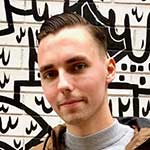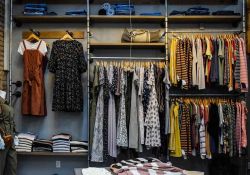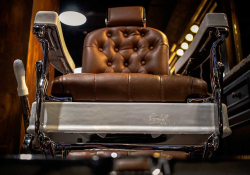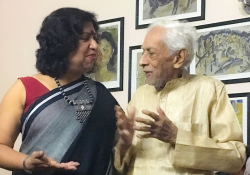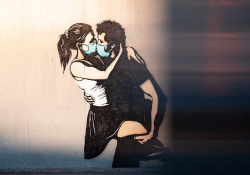Everywhere Bergamo
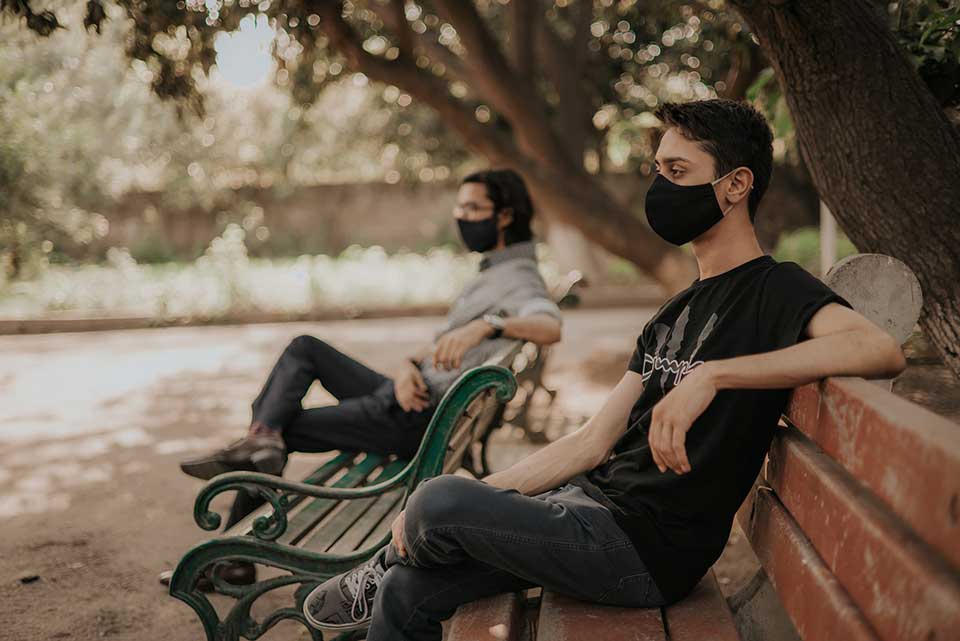
In the summer of 2020, a man who has lost much dreads reopening, when everyone will be with everyone again, but he will be alone.
The sign on the window read: NO TALKING POLITICS OF COVID. He did not understand whether this meant any talk of the pandemic, so he did not speak at all. A large man sat in one of the free chairs in the corner, his mask pulled down to his neck, grinning. He was too timid to ask the man to pull his mask up, even though the man should have had his mask on the entire time: they were sitting indoors, where fresh air did not disperse the virus, and even speaking could spread small particles from one person to another. Afterward he bowed to his barber at a distance: after months alone he wanted to cry at the kindness of another human to do him a service. The hair piled by the chair looked like the hair of a stranger. At home he studied charts on risk rates and regretted shaving his head, for the barbershop was sixth or seventh worst, he should have never gone, and he woke each morning for the next three to fourteen days fearful that he would have a cough, a fever, a sore throat, diarrhea, an early sign of death.
Afterward he bowed to his barber at a distance: after months alone he wanted to cry at the kindness of another human to do him a service.
*
He was working the day they canceled all the seasons and the leagues. It was the worst in China and Europe. In two weeks, they said, it would ravage his American city. It would be bodies stacked in tents, elderly corpses carted off en masse, uncountable corpses, dying bodies on carts in hallways, solitary victims clutching their tanks of air, coffins stacked like inventory in warehouses, workers in hazmat suits, old women locked in their homes praying for their dying lovers, and sirens wailing all day and night through the street. It would be everywhere Bergamo.
He had normally worn gloves and wiped his workstation while collecting tickets at the subway. But when he read the reports he left a note for his supervisor that he had to leave. Now, on the television, they were talking about loneliness and the psychological effects of fear.
*
The frenzy of setting and checking and checking again his alarm every evening—and waking with sudden heart beating and showering, dressing, eating, speed-walking through the streets, arriving at work fifteen minutes early at least—all slowed, slowed, and his body forgot the stress of routine like it forgets a sudden arrhythmia. But he woke early, nonetheless, because he had trained his body to. He stood at the window and watched the street. After weeks in the apartment alone he woke with the timid sun, watched the empty street for an hour, and went out to the park before others would. There he stood with his hands at his sides and breathed slowly and watched the dew rise from the green leaves overhanging the pond.
All was quiet. He walked slowly as squirrels ran through the untrafficked streets, leaping over potholes. The roads did not reek as much as they used to, nor the water, so he extended his walk, looking at the opaque apartment windows. Soon he saw others—their tired eyes shifting quickly over the tops of their masks; his lips straining against his held breath—and he took the alleys home. He stripped from his clothes, disinfected his hands, his keys, his shoes, and his face and his hair. He watched and read the news all afternoon, following the emerging, contradictory science of life and death.
*
After long quarantine—what used to be called solitude or loneliness but was now called social distancing—seeing the faces of others struck him with more wonder than before. He had seen thousands each day through the glass of his ticket booth. Now he came for air out in the middle of the day and saw women walking to the park. No, this is not lust, not now. It is beauty, it is more than beauty—the men too, their unchanging voices, their gait—it is beyond words.
*
On a walk at six a.m. he thought of the city as the land beneath the city, the tranquil people trample with millions of fast-moving feet, horns honking, arguments and conversations, the chatter of retail and plates, music, theatrical shows of people alone onstage. All atop a quiet that slowly returns. His dear ancestors, whoever and wherever they were, would sicken at the lights and noise of his time. One morning he saw a deer stepping with thin legs into the middle of the street, nosing the filthy concrete for some flowers or some fruit . . .
*
He scrubbed his hands so often—for triple the recommended length—that one finger became chapped and red, then another, then all ten of his fingers and his palms, dried and red and burning to the touch.
*
What went on behind those walls? Those closed doors, those one-bedroom, two-bedroom units? Those midrises and those studio walkups? In those little rooms obscured by neighbors’ bodies, which he could glimpse over their shoulders, seeing a plant, a metal bookcase, ripe fruits on the counter as the keys jangled and the door shut?
Surely some lay in bed all day. Others, perhaps, walked their bedrooms from wall to wall, counting their steps. Maybe, like him, they sat at the kitchen table for thirty minutes, forty, beyond an hour after they had their juice and toast, staring at the refrigerator and not thinking at all. Later, on the couch, the unmoving ceiling, and scrolling the breaking news, panicking without getting up, swiping farther into prophecy of a common doom.
The lucky ones were quarantined together, like the dream of medieval lovers, locked in their little space alone.
Through the walls he could hear professional voices on the phone. Maybe they were dressed in blazers and skirts, not wearing any shoes but sitting with good posture at the webcam. The lucky ones were quarantined together, like the dream of medieval lovers, locked in their little space alone. They were exploring each other’s limits, their passions and faults, and the curvatures of each other’s bodies, so loud. Some were unlucky and they yelled at each other and he heard silence and soft cries. Others were not sleeping, either, and he listened to the wooden floors wailing above at three in the morning, lying in bed, watching the green numbers on the digital clock. He wished he could pull up the walls, like from a plastic house, and see into all those rooms, all those beds, identical in their placement, and the still bodies lying with coarse breathing and eyes tensely awake.
*
Nicholas wanted to catch up soon. He could no longer be avoided: biweekly texts could only be declined in limited ways. He could no longer tell Nicholas he was waiting for the government to open the cafés; he could not tell him he was busy with work; he could not tell him he was packing his baseball cards and driving them to the convention two hundred miles away; he could not tell him, more than anything else, that he feared the site of other bodies, those filthy, decaying organisms that sweat and that coughed, that spit, that even breathed a disease that could lay him into a hospital struggling for air, into the address line of a two-million-dollar medical bill, into a news report about the ill (lying in baby blues, face blurred), into a coffin and a daily briefing for numbers locally dead.
Nicholas had two parents and three siblings he had recently visited in the countryside. That made five. His father frequented the hardware store, which could have had up to one hundred other people in the aisles, touching the cans of paint and the wooden planks. Two of his siblings had spouses; all three drove separately to the parents’ house, meaning they had to stop for gas and touch at a minimum the handles, the 87 button, and the yes or no buttons to receive a receipt, all of which would have been touched by at least ten and possibly dozens of others in that day, let alone the previous three days, which was the known lifespan of the virus on various surfaces, and not including the others standing at those gas stations either coughing or simply breathing the shared air; all six of them brunched with the neighbors at the backyard table; the neighbors could have been from three to six people, maybe more; they each could have spoken to other neighbors or at least walked through supermarkets, exposing themselves to say one hundred people in total (a conservative estimate); Nicholas admitted he had gone grocery shopping the prior week and had not rushed from item to item on his list, instead sauntering as if in unapocalyptic times; Nicholas had also seen at least three friends and joked and played video games over Trulys, surely touching shared controllers and laughing at least once forcefully out loud. All this added to direct contact with ten individuals, all of whom may have been asymptomatic or mildly symptomatic or certainly symptomatic but lying to themselves that they just had a head cold or did not believe in the virus’s ability to doom, as many people died from the flu and the black plague was worse, anyway. Indirectly, Nicholas could have had contact with 750 people. He was too weary to calculate the percentage of risk meeting Nicholas would have, but he knew, for certain, that he would not be able to see the death creeping toward him, not in Nicholas’s blue eyes and not in his familiar voice. Two hours to catch up, maybe one, or fifteen minutes at most, and he could be lying on his bed, wheezing like the people on the news and deposited in communal graves.
Repeated texts and a lack of assertion brought them together anyway. He had convinced Nicholas to meet outdoors, with masks, standing by the lake, before the city woke and they would have to encounter strangers and their germs. He took a risk, but Nicholas was his only college friend and he could not lose another person who cared about his life.
“Crazy stuff going on,” Nicholas said. “We’re living through some crazy times.”
He said little in response. After not speaking for weeks, words came out like bile.
“The rollercoasters in Japan say, ‘Please scream inside your heart.’”
“I would never go,” he said.
“Are you on unemployment yet?”
“No,” he said. “Technically, I resigned.”
“I’m on unemployment. So are my other friends.”
An old man in an Italian hat walked slowly by. He stepped back from the old man onto the grass, all the while fearing he was staining his white shoes.
Nicholas did not move from the railing by the lake.
“You aren’t getting tired of being alone?” Nicholas said. “I just made a Hinge to talk to new people. I send them paragraphs about what I’ve been thinking and they don’t say much.”
“I don’t know,” he said.
The phone alarm rang fifteen minutes. He walked quickly, regretting the meeting. At home he would throw his clothes and his mask immediately into the washer and he would scrub his skin red in the shower for half an hour. It was too late now: Nicholas and his seven hundred contacts, along with the dog-walkers and the heavy-breathing joggers he passed on the walk up to his place. Birds were singing and squirrels ran by. Death was other people.
*
Sometimes, lying there in the night, in the blue glow of his phone, he could hear his mother and father talking again at the kitchen table, drinking their coffee and quietly making plans for their life in old age. He did not think of them lying in hospital beds—first his mother, grayed and in blues, then his father pale like a spoiled organ—or of his fear to visit them, or of their unattended funeral and death.
*
They didn’t double-bag it: the paper tore and the gallon of milk broke over his knee. Green apples rolled out to strangers’ cautious feet and under soda displays, the yogurt cups broke and splattered—and the thin handle for the second bag ripped, everything fell again, spilled all over the tiled floor, exposed, and the eyes of strangers, not moving—an employee coming over, his nostrils free over his mask—No, no, he said, no, please no, but he spoke so quietly behind his doubled masks that no one could hear him, the employee was already bent over picking up his things, and everyone was staring, all the groceries were contaminated, and he fled.
*
At night, when he could not sleep, he propped his cell phone against the books and shadowed exercises in his living room. In thirty days, they promised, you will have abs. They were beautiful women and men, charming and fit, perfect in their youth, gliding through their lunges and lifts. He could not hold any of the poses for long. His body trembled, he bit down on his lips, and looking at their bodies he imagined himself coming out of quarantine more certain, handsome, joyful, strong.
*
The news said things about numbers and deaths. The scientific method at process, one man sitting before a bookcase said. One day it was bad; another it was worse. They said ten times what they were reporting could be changed, and he had no defenses besides solitude and fear.
They also talked about the rats feasting on each other in the daylit streets. And to reopen the economy, the Wall Street men grabbing for stocks and government funds.
*
A vision at dawn, the light slightly rousing the streets, everything mauve and gray rising over the unnetted and vacated tennis courts, against the deep blue of the backboard: two genderless figures in tights, shrouded in half-light, standing en pointe with their limbs set at perfect curves, slowly turning on fixed toes like ballerinas in the music boxes of youth.
*
On YouTube a teenager was telling a funny story. He remembered high school and the way she spoke made him forget everything since. He was laughing, laughing loud and crying, saying to her image on the dim phone screen in a full and breaking voice, O yes, I remember, ha ha ha, that’s right, you understand, I remember how it was.
*
Waking, early morning, cold lining the throat.
No, he said aloud, I am never going out, not until a vaccine, never again.
*
Soon, he read, things would be opening again. Up to fifty people could gather at each other’s homes. People could sit inside restaurants again. They could go for drinks, take pictures at brunch, escape the boundaries of their small apartments and their laptop screens. They would see all their friends again—close friends from work and from the neighborhood, from college, from high school, from restaurants and vacations and concerts and bars—friends he did not have to see, friends that would go to the beaches together, drink cocktails together, like each other’s posts on social media together and message each other saying, How are you, how have you been?
He started to feel a sadness much more strongly than the news of the world closing. Everyone would be with everyone again. He would be alone. He longed for the quiet desperation of the city, for the moments of terror that led everyone to flash their lights and bang on pans and clap, for the daily briefings on the state of the world, for the shared caution in grocery shoppers’ eyes, for the communion of loneliness and longing, for the fleeting understanding, at last, that they would lose everything they loved and be buried alone.
*
He dreamt of passing others in masks, not able to read their eyes, people hidden behind large face shields and gloves, making it through the loneliness, confronting themselves in a world slowed to silence, like how it always was before people barged in with their ruckus and their weapons, with their egomania and their rage, with their inconsolable sorrow.
In the morning he was tired and coughing. He felt like he had been ripped from a dream. The doctors said that if you are ill do not go into an emergency room for a test. Or was that before? When they didn’t have enough tests? Was he meant to go out to be checked? Would he be able to call for help?
He stayed in bed, shaking, not knowing what to do.
Madison, Wisconsin
